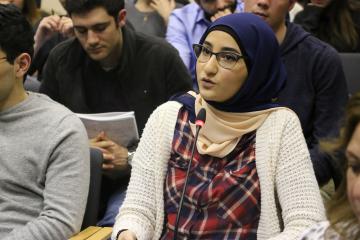
A new report on fiscal policy was presented on Tuesday at the American University of Beirut (AUB), providing information on whether the Arab region’s current approach can support the achievement of the United Nations’ 2030 Agenda for Sustainable Development.
The report produced by the UN Economic and Social Commission for Western Asia (ESCWA), entitled Rethinking Fiscal Policy for the Arab Region, explores how the region could jeopardize reaching the Sustainable Development Goals (SDGs) unless a “course correction” addresses the pressing need for economic reforms, social investments and better governance.
“The report argues that many countries in the region are lagging behind in connecting fiscal policy and development aims,” said Mohamed El Moctar Mohamed El Hacene, Director of the Economic Development and Integration Division (EDID) of ESCWA.
“For several decades, Arab Governments have predominantly emphasized privatization, liberalization, and the retreating role of the State through expenditure cuts toward achieving efficiency and macroeconomic stability. But given the increasingly precarious situation of many countries, solving today’s development challenges requires a reassessment of accepted notions. A course correction is required,” he stressed.
Recommendations in the report build on the understanding that fiscal policy is crucial to economic reforms and social investments are required to attain more inclusive and sustainable development.
“Fiscal policy is not just a question of cost-cutting and efficiency, but of smart investment in people and the pursuit of inclusive human development as envisioned in the 2030 Agenda,” said Niranjan Sarangi, First Economic Officer at ESCWA and lead author of the report.
“An understanding of how economic structures and policy choices produce fundamentally different human and economic welfare outcomes informed the analysis and recommendations of this study,” he added.
The panel was organized as part of AUB’s symposium series on economic policy organized by the Institute of Financial Economics (IFE). It also welcomed other discussants such as Mazen Soueid, Chief Economist at the Lebanese Bankmed. Dozens of students attended and engaged in a dialogue about the report’s findings.
Nadine Abdel Fatah, who studies economics, noted the importance of learning more about fiscal policy options. She said the report complements her research and can support the analysis she is undertaking on what can be done to enhance the economic situation of Arab nations.
Razan Amin, also a student of economics, said the report can lay the grounds for structural change, especially if youth are part of the solution.
Meanwhile, Clemens Luckner, an exchange student from Germany, was more skeptical: “I was expecting more due to the title ‘Rethinking Fiscal Policy,’ as I thought there was going to be a whole new approach,” he stated, noting his particular interest in the section on the causes of deficit related to dependency on foreign aid rather than on local resources.
“The report does not advocate a paradigm shift in rethinking fiscal policy, but it does advocate a fundamental change in the perspective of the role of the State toward rethinking fiscal policy,” explained Mr. Sarangi. “This report urges a departure from conventional fiscal policy reports. It proposes several primary considerations to align economic policy with measures to reverse the root causes of socioeconomic crisis and deepening disparities.”
Questions from the reactive audience—many of whom are likely to shape economic policies of the future—also revolved around how fiscal recovery is possible in the face of conflict and instability.
“Peace and stability is the bedrock of development, and improving overall governance is key,” emphasized Khalid Abu-Ismail, Chief of the Economic Development and Poverty Section of EDID. “Fiscal policy both influences and manifests governance dynamics.”
Indeed, while fiscal choices can determine the pace of poverty reduction, the prospects for decent work, the quality of investments in health and education, and the prospects for peace, the report also underscores that governance reforms and political stability are equally critical in guiding policy towards those ends.





